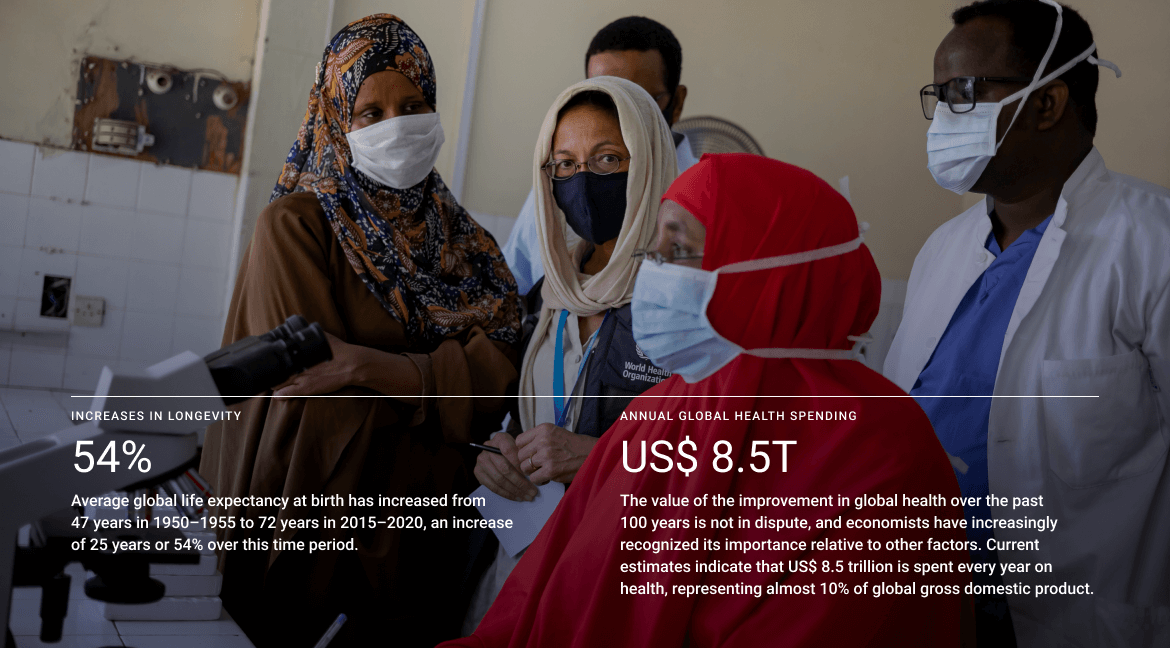
Chapter 1
The case for investing in health
The case for investing in health
Good health is a vital component of human well-being, and enables individuals and communities to build satisfying and productive lives.
Since the establishment of WHO in 1948, there has been an unprecedented improvement in human well-being and longevity. Average global life expectancy at birth has increased from 47 years in 1950–1955 to 72 years in 2015–2020¹, an increase of 25 years or 54% over this time period. Even though many factors have shaped these major improvements in global health, including rising economic prosperity, rapidly growing medical knowledge, and more effective systems and institutions to apply that medical knowledge to the whole population, WHO has been pivotal in catalysing and securing these health outcomes.
The value of the improvement in global health over the past century is not in dispute, and economists have increasingly recognized its importance relative to other factors. Current estimates indicate that US$ 8.5 trillion is spent every year on health, representing almost 10% of global gross domestic product.² An estimate for five countries (Brazil, China, India, the United States of America and Venezuela (Bolivarian Republic of)) suggests that the value of health capital is more than twice as large as all other forms of capital combined.³

.tmb-1920v.png?sfvrsn=97829a40_1)
This shift in recognizing the value of health has been accompanied by a reorientation towards regarding health as an investment, in common with a wider change in the way in which expenditure in areas of long-term benefit to citizens is regarded. Global targets and estimates of associated resource needs have been extensively used in global health to mobilize resources and drive progress, but they have traditionally been rooted in a commodity approach which regards such spending as a consumption expenditure. Such a perspective often focuses on the resources required for the scale-up of discrete interventions rather than overall outcomes and results, such as increasing healthy life expectancy, and can lead to a fragmented view of health as merely the aggregation of separate interventions, each of which competes for a share of the funding pie.
The WHO Council on the Economics of Health for All has been leading a reappraisal of health for all as a public policy objective, and the structural changes that are needed to ensure that national and global economies and finance can deliver this ambitious goal. The Council has argued that investments in health are characterized by strong positive externalities,that is the gains to society extend beyond the direct return to investors because there are more than just monetizable benefits and they are reaped over a long-term horizon. Fiscal space at the governmental level is critical to financing investments in public goods including health.
- United Nations World Population Prospects 2019, ( https://population.un.org/wpp/DataQuery/, accessed 17 March 2022).
- Global expenditure on health: public spending on the rise? Geneva: World Health Organization; 2021 (https://apps.who.int/iris/rest/bitstreams/1400583/retrieve, accessed 17 March 2022)
- Arrow KJ, Dasgupta P, Goulder LH, Mumford KJ, Oleson K. Sustainability and the measurement of wealth. Environ Dev Econ. 2012;17:317–353. Schwartländer B, Stover J, Hallett T, Atun R, Avila C, Gouws E et al. Towards an improved investment approach for an effective response to HIV/AIDS. Lancet. 2011; 377(9782):2031-41.doi: https://doi.org/10.1016/S0140-6736(11)60702-2.
- WHO Council on the Economics of Health for All. Financing health for all: increase, transform and redirect. Geneva: World Health Organization; 2021 (Council Brief No. 2; https://www.who.int/publications/m/item/council-brief-no-2, accessed 17 March 2022)
